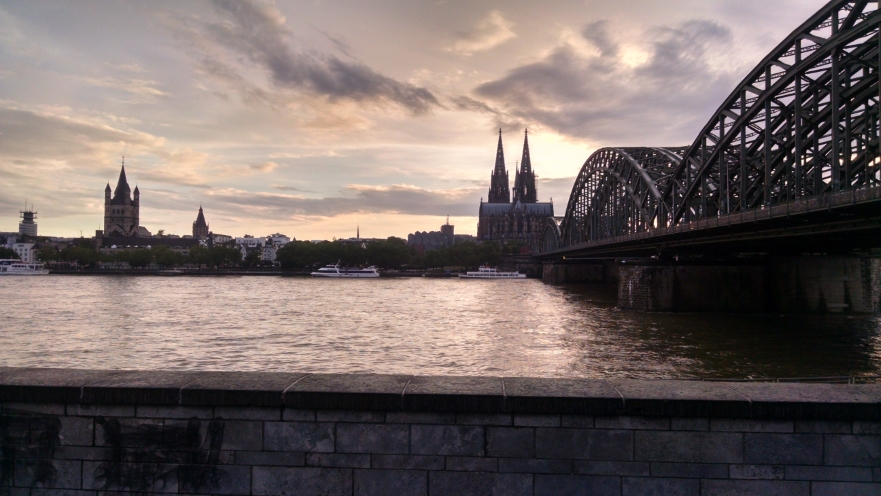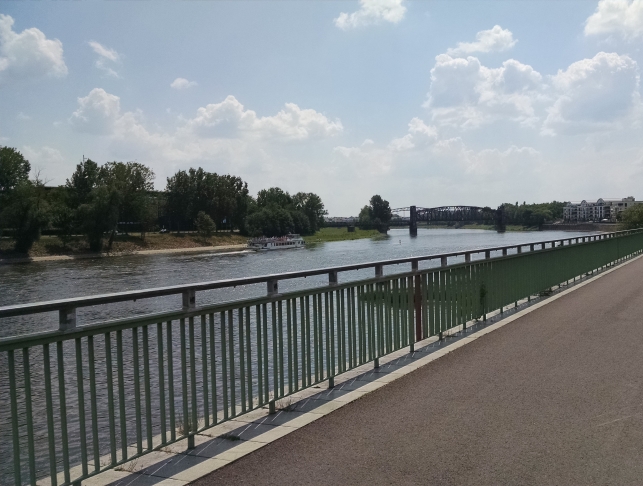Microfluidics in Magdeburg

Cologne, Germany. Looking over the Rhine river towards the Cologne Cathedral.
During my sophomore year of college, one of my academic advisors told me about the DAAD RISE program. DAAD RISE is a program organized by the German government that gives scholarships to students from the UK, Canada, and the US so they can spend a summer performing research in a German laboratory. It seemed like an amazing opportunity, but it never really crossed my mind to apply. There were sure to be tons of students applying, and I was just a sophomore. I had some research experience under my belt thanks to the University of Utah’s honor’s college, but it seemed like a long shot and there were a few Summer classes I wanted to take to lighten my course load going forward.
A year later, my advisor mentioned DAAD RISE again. For the next month, the program haunted me. I had never even been across the Atlantic before, let along living in a different country with a different language for three months. Still, it was the last year I was eligible for the program. My fear of missing out battled with my fear of the unknown until I finally decided to at least take a look at their website. The program looked amazing. The places I would visit looked amazing. The research I would be participating in looked unbelievably cool, but the deadline to apply was a week away! I worked like a madman to put together a resume, write cover letters, and gather letters of recommendation so I could send in my application, and I managed to get it all in the day before it was due.
The next thing I knew, I had actually been accepted. Out of a pool of 1,500 college sophomores and juniors who applied, I was one of the 200 absurdly lucky students who had been chosen for the scholarship. After a few minutes of breathless screaming, I enrolled in a free online German course, and started looking up tickets to Munich.

The Elbe river trail in the heart of Magdeburg, Germany. This path ran right next to the Max Planck Institute, and I spent many sunny days biking around on it.
In May, I started my internship at the Max Planck Institute for Dynamics of Complex Technical Systems (German names are even long in English) in Magdeburg Germany. There, I spent the next three months helping a PhD student named Dorothee Krafft refine a microfluidics system to make water-in-oil-in-water double emulsion vesicles. One of the umbrella projects at the Max Planck Institutes is MaxSynBio. This project involves hundreds of researchers, and its goal is to create a minimal viable cell using a “Bottom-Up” approach. In other words, the researchers are trying to combine the basic chemicals of life to build cells that can maintain homeostasis, generate energy, and reproduce themselves. These cells could serve as a basic biological chassis on which other scientists could add features. For instance, you could add genes to these artificial cells which let them synthesize insulin, and since their only function would be to make insulin, they would be much more efficient at it than other organisms such as E. coli.


Saeki, Daisuke, et al. "Microfluidic preparation of water-in-oil-in-water emulsions with an ultra-thin oil phase layer." Lab on a Chip 10.3 (2010): 357-362.
My research was only a tiny piece of the MaxSynBio project. Dorothee hoped that the vesicles we were creating could one day form the membranes of an artificial cell, or be used to deliver nutrients to a growing artificial cell. The work took a long time, and I spent some long days in the lab making microfluidics chips. Finally, on my last day in Magdeburg before heading home, we got our process just right and managed to build a system that began efficiently pumping out tiny, double emulsion vesicles!
The DAAD RISE program isn’t just about giving students great research experience, however, it’s also a way to lure the best and brightest young scientists away from the UK and North America and make them fall in love with Germany. They do an amazing job. The program covers money for rent, and also gives students a stipend to go explore the country. I was very lucky that Magdeburg is a fairly large hub for the country’s excellent railway system (Germans hate it, but most of them have never had to deal with Amtrak!). I visited most of the different regions in Germany, spending time in Hamburg, Berlin, Cologne, the Harz mountains, and even dipping down into Prague for a weekend!

A dumb American at the Max Planck Institute in Magdeburg, Germany.
I started the summer absolutely terrified about living in another country without knowing the language. Luckily, my first solo trip abroad was an amazing country, with some of the nicest people on the planet (who have way too much patience for dumb Americans like me!). By the time I got on the plane in Berlin to head back to the US, I was a seasoned traveler, with no fear of stepping on a train and setting off for parts unknown!